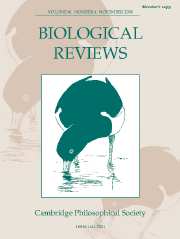Crossref Citations
This article has been cited by the following publications. This list is generated based on data provided by
Crossref.
Hayes, Loren Donald
2000.
To nest communally or not to nest communally: a review of rodent communal nesting and nursing.
Animal Behaviour,
Vol. 59,
Issue. 4,
p.
677.
Ebensperger, L.A.
Botto-Mahan, C.
and
Tamarin, R.H.
2000.
Nonparental infanticide in meadow voles,Microtus pennsylvanicus: the influence of nutritional benefits.
Ethology Ecology & Evolution,
Vol. 12,
Issue. 2,
p.
149.
Ferrari, P.F.
Palanza, P.
and
Parmigiani, S.
2000.
Does fear modulate defensive and offensive types of maternal attack in mice?.
Aggressive Behavior,
Vol. 26,
Issue. 2,
p.
193.
Palombit, R.A.
Cheney, D.L.
and
Seyfarth, R.M.
2001.
Female–female competition for male ‘friends’ in wild chacma baboons (Papio cynocephalus ursinus).
Animal Behaviour,
Vol. 61,
Issue. 6,
p.
1159.
Wolff, Jerry O.
and
Dunlap, Aimee S.
2002.
Multi-male mating, probability of conception, and litter size in the prairie vole (Microtus ochrogaster).
Behavioural Processes,
Vol. 58,
Issue. 1-2,
p.
105.
Wolff, Jerry O.
Daniel Edge, W.
and
Wang, Guiming
2002.
EFFECTS OF ADULT SEX RATIOS ON RECRUITMENT OF JUVENILE GRAY-TAILED VOLES, MICROTUS CANICAUDUS.
Journal of Mammalogy,
Vol. 83,
Issue. 4,
p.
947.
Wolff, Jerry O.
2003.
Mammal Community Dynamics.
p.
614.
Jacquot, Joseph J.
and
Solomon, Nancy G.
2004.
EXPERIMENTAL MANIPULATION OF TERRITORY OCCUPANCY: EFFECTS ON IMMIGRATION OF FEMALE PRAIRIE VOLES.
Journal of Mammalogy,
Vol. 85,
Issue. 5,
p.
1009.
Hager, Reinmar
and
Johnstone, Rufus A.
2004.
Infanticide and control of reproduction in cooperative and communal breeders.
Animal Behaviour,
Vol. 67,
Issue. 5,
p.
941.
Wolff, Jerry O.
and
Macdonald, David W.
2004.
Promiscuous females protect their offspring.
Trends in Ecology & Evolution,
Vol. 19,
Issue. 3,
p.
127.
Broom, Mark
Borries, Carola
and
Koenig, Andreas
2004.
Infanticide and infant defence by males—modelling the conditions in primate multi-male groups.
Journal of Theoretical Biology,
Vol. 231,
Issue. 2,
p.
261.
Agoramoorthy, Govindasamy
and
Hsu, Minna J.
2005.
Occurrence of Infanticide among Wild Proboscis Monkeys (Nasalis larvatus) in Sabah, Northern Borneo.
Folia Primatologica,
Vol. 76,
Issue. 3,
p.
177.
Kiyota, Masashi
and
Okamura, Hiroshi
2005.
HARASSMENT, ABDUCTION, AND MORTALITY OF PUPS BY NONTERRITORIAL MALE NORTHERN FUR SEALS.
Journal of Mammalogy,
Vol. 86,
Issue. 6,
p.
1227.
Beehner, J.C.
Bergman, T.J.
Cheney, D.L.
Seyfarth, R.M.
and
Whitten, P.L.
2005.
The effect of new alpha males on female stress in free-ranging baboons.
Animal Behaviour,
Vol. 69,
Issue. 5,
p.
1211.
McLellan, Bruce N.
2005.
Sexually selected infanticide in grizzly bears: the effects of hunting on cub survival.
Ursus,
Vol. 16,
Issue. 2,
p.
141.
Ensminger, Amanda L.
and
Meikle, Douglas B.
2005.
Effects of male kinship and agonistic behaviour on reproduction and odour preferences of female house mice, Mus domesticus.
Animal Behaviour,
Vol. 69,
Issue. 5,
p.
1147.
Gilchrist, Jason S.
2006.
Female eviction, abortion, and infanticide in banded mongooses (Mungos mungo): implications for social control of reproduction and synchronized parturition.
Behavioral Ecology,
Vol. 17,
Issue. 4,
p.
664.
Pluháček, Jan
Bartoš, Luděk
and
Víchová, Jitka
2006.
VARIATION IN INCIDENCE OF MALE INFANTICIDE WITHIN SUBSPECIES OF PLAINS ZEBRA (EQUUS BURCHELLI).
Journal of Mammalogy,
Vol. 87,
Issue. 1,
p.
35.
Andreassen, Harry P.
and
Gundersen, Gry
2006.
MALE TURNOVER REDUCES POPULATION GROWTH: AN ENCLOSURE EXPERIMENT ON VOLES.
Ecology,
Vol. 87,
Issue. 1,
p.
88.
Sikkel, Paul C.
and
Kramer, Donald L.
2006.
Territory revisits reduce intrusion during spawning trips by female yellowtail damselfish, Microspathodon chrysurus.
Animal Behaviour,
Vol. 71,
Issue. 1,
p.
71.




